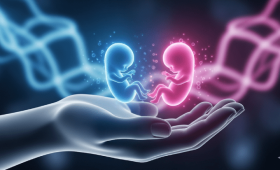What Preparations Should Be Made Before IVF Treatment?
Being physically and mentally prepared before starting IVF treatment increases the chances of success. First, you should focus on a healthy and balanced diet. Harmful habits like smoking and alcohol should be strictly avoided. It is also important to start using supplements such as folic acid, vitamin D, and iron, but the dosage of these supplements should be determined by a professional. Reaching an ideal body weight and doing regular light exercises are also of critical importance for the positive outcome of the treatment. These preparations increase the quality of eggs and sperm, allowing you to start the process more strongly.
How Does Lifestyle Affect IVF Treatment?
Lifestyle has a direct effect on the success of IVF treatment. A healthy lifestyle improves the quality of reproductive cells and helps the body respond better to treatment. Regular sleep, staying away from stress, and a balanced diet are the cornerstones of this process. It is also important to limit caffeine consumption and drink plenty of water. Positive changes in your lifestyle will make you feel better both physically and psychologically and help you get through the treatment process more comfortably.
What Is the Importance of Nutrition in IVF Treatment?
Nutrition in IVF treatment is one of the most important factors affecting the success rate. Antioksidan açısından zengin meyve ve sebzeler, sağlıklı yağlar içeren avokado ve fındık gibi gıdalar, yumurta ve sperm kalitesini artırır. Akdeniz diyeti gibi dengeli beslenme modelleri, tedavinin olumlu sonuçlanmasına yardımcı olabilir. Şekerli ve işlenmiş gıdalardan uzak durmak, vücuttaki inflamasyonu azaltarak embriyonun rahme tutunma şansını yükseltir.
How Does Stress Management Affect IVF Success?
Stress is one of the most important factors that can negatively affect IVF treatment. High stress levels can lead to hormonal imbalances, which can lower egg quality and the embryo’s chance of implantation. Therefore, methods such as yoga, meditation, regular walks, or engaging in hobbies should be used to manage stress throughout the treatment. Additionally, receiving emotional support and going through this process with your partner is very important. To get away from stress, you can plan a relaxing vacation with Cure Holiday.
How Many Days Does IVF Treatment Take?
The duration of IVF treatment varies depending on the protocol applied and the person’s condition, but it usually takes between 15 and 20 days. This process consists of stages such as ovarian stimulation, egg retrieval, fertilization, and embryo transfer. During the treatment, check-ups are done at certain intervals, and medication doses are adjusted. This allows you to make a detailed plan and prepare yourself for the process before starting the treatment.
Is Pain Felt During IVF Treatment?
The pain felt during IVF treatment varies from person to person and is generally at a minimum level. There may be a slight feeling of discomfort during ovarian stimulation. The most painful stage is the egg retrieval procedure, but since this procedure is done under anesthesia, no pain is felt. The embryo transfer is usually a painless procedure. Painkillers recommended by professionals can be used to manage possible discomfort.
What Is the Success Rate of IVF Treatment?
The success rate of IVF treatment varies depending on many factors. Factors such as the woman’s age, egg quality, sperm quality, the cause of infertility, and the treatment protocol applied determine the success. In general, the success rate decreases with age. The success rate is higher in women under 35, while this rate decreases in those over 40. A careful evaluation of all these factors is important to maximize success.
Is Intercourse Forbidden During IVF Treatment?
During IVF treatment, sexual intercourse may be restricted or not recommended during some stages of the treatment. Sexual intercourse is not recommended after ovarian stimulation and egg retrieval due to the sensitivity of the ovaries and the risk of infection. Following the guidance of professionals on this matter is very important for the healthy progression of the treatment. You will be given detailed information on which stages of the treatment you should avoid sexual intercourse.

When Is Pregnancy Confirmed in IVF Treatment?
To confirm pregnancy in IVF treatment, you need to wait approximately 10-14 days after the embryo transfer. At the end of this period, pregnancy is detected with a beta-hCG blood test. This waiting period can be a very exciting and emotional time for couples. It is very important to be patient, listen to yourself, and stay away from stress during this process. You need to keep your hope alive to encounter a positive result.
How Many Embryos Are Transferred at Once in IVF Treatment?
The number of embryos to be transferred at once in IVF treatment is determined by the woman’s age, embryo quality, and previous attempts. Generally, a single embryo transfer is preferred for young patients, while two embryos may be transferred in more advanced ages or in repeated unsuccessful attempts. This aims to maximize the chance of success while reducing the risk of multiple pregnancies.
What Tests Are Done Before IVF Treatment?
Before starting IVF treatment, comprehensive tests are done for both the man and the woman. For women, hormone tests (AMH, FSH, E2) and ultrasonography are done to determine ovarian reserve. A hysterogram is performed to check the condition of the uterus. For men, a sperm analysis is done. These tests are of critical importance to determine the cause of infertility and to choose the most suitable protocol for the treatment.
What Determines the Cost of IVF Treatment?
The cost of IVF treatment varies depending on the chosen treatment protocol, the medications used, additional procedures (such as PGT genetic tests), and the country where the treatment will be performed. A detailed cost analysis will be presented to you before starting the treatment. It should not be forgotten that one of the most important factors determining the price is the quality of the treatment and the scope of the services offered.
How Many Times Can IVF Treatment Be Attempted?
Although there is no definite limit to the number of IVF treatment attempts, most couples achieve success after 3 to 4 attempts. After each unsuccessful attempt, the reasons are examined in detail, and a new treatment plan is created. You can continue the attempts as long as you feel psychologically ready and believe that you can handle the process financially.
Can Strenuous Exercises Be Done During IVF Treatment?
Strenuous exercises should be strictly avoided during IVF treatment. Heavy exercises done during ovarian stimulation can lead to serious complications such as ovarian torsion or cyst rupture. During this period, light and relaxing exercises such as walking and yoga should be preferred. Exercise helps reduce stress, but at the same time, it does not tire the body and supports the treatment process.
What Are the Nutritional Supplements in IVF Treatment?
Nutritional supplements in IVF treatment should be used as recommended by professionals. Folik asit, D vitamini, Koenzim Q10, and Omega-3 fatty acids are the most frequently recommended supplements. Folik asit, bebeğin nöral tüp gelişimi için hayatiyken, Koenzim Q10 yumurta kalitesini artırmaya yardımcı olabilir. These supplements’ proper dosage and timing can positively affect the success of the treatment.
Why Is Alcohol and Smoking Use Forbidden in IVF Treatment?
Alcohol and smoking negatively affect reproductive health in both men and women. Smoking reduces ovarian reserve, lowers egg quality, and reduces the embryo’s chance of implantation in the uterus. Alcohol, on the other hand, impairs sperm quality. Therefore, smoking and alcohol consumption should be completely stopped at least 3 months before starting IVF treatment. This simple precaution significantly increases the chances of success of the treatment.
Why Is a Hysterogram Performed in IVF Treatment?
A hysterogram (HSG) is performed in IVF treatment to check the internal structure of the uterus and whether the fallopian tubes are open. This procedure is of vital importance to understand whether the environment where the embryo will implant is healthy. If there is a problem such as a polyp, myoma, or adhesion in the uterus, these problems need to be resolved before starting the treatment.
How Is Egg Quality Improved in IVF Treatment?
Egg quality is one of the most important success factors of IVF treatment. To improve egg quality, a diet rich in antioxidants, regular exercise, staying away from stress, and a healthy sleep pattern are very important. Vitamin and mineral supplements recommended by professionals can also support egg quality. These factors contribute to the healthy development of ovarian cells.
How Is Sperm Quality Improved in IVF Treatment?
Sperm quality is as important as egg quality in IVF treatment. To improve sperm quality, a healthy and balanced diet, regular exercise, staying away from harmful habits like smoking and alcohol, and avoiding stress are necessary. Additionally, some vitamin supplements recommended by professionals can also help increase sperm motility and count.
How Are Emotional Changes Related to IVF Treatment Managed?
IVF treatment can cause intense emotional fluctuations due to hormonal changes and uncertainties. It is very important to be patient with yourself and your partner during this process. To get emotional support, you can talk to a counselor, join support groups, or share your feelings openly with your partner. Spending time on relaxing exercises and hobbies can also be beneficial to cope with the stress brought by the treatment.
In Which Situations Do the Chances of Success Increase in IVF Treatment?
The most important factors that increase the chance of success in IVF treatment include the woman’s young age, good egg and sperm quality, a healthy uterine structure, and a previous pregnancy. In addition, the patient’s ability to stay away from stress, eat a healthy diet, and follow all professional advice also positively affects the success rate. When these factors come together, the chances of success of the treatment are maximized.
What Are the Side Effects of Hormonal Medications in IVF Treatment?
Some hormonal medications used in IVF treatment can have side effects. These side effects include bloating, abdominal pain, nausea, headache, and emotional fluctuations. These side effects are usually mild and disappear when the medication is stopped. Medication dosages are closely monitored by a professional to minimize possible side effects.
When Can I Return to Work After IVF Treatment?
Returning to work after IVF treatment varies depending on the person’s physical condition and the nature of their job. Resting for a few days after the embryo transfer is recommended. If you do not have a physically demanding job, you can return to your normal life after a few days. However, it is important to avoid lifting heavy objects and strenuous activities.

How Much Weight Should I Be for Success in IVF Treatment?
An ideal weight in IVF treatment increases the chances of success. Both being overweight and being underweight negatively affect hormonal balance, which in turn affects egg and sperm quality. Ideally, it is important for your body mass index (BMI) to be within a healthy range. You can get help from a dietitian on this matter to reach your ideal weight before starting the treatment.
What Is the Importance of Sleep Schedule in IVF Treatment?
Regular and sufficient sleep in IVF treatment is of critical importance for the body to renew itself and for hormonal balance to be maintained. Insufficient sleep can increase stress hormones and negatively affect the treatment. Therefore, you should be careful to get at least 7-8 hours of quality sleep per day.
How Is the Pregnancy Test Done in IVF Treatment?
In IVF treatment, the pregnancy test is done with the beta-hCG hormone, which is checked in the blood approximately 10-14 days after the embryo transfer. This test gives the most accurate result and is more reliable than urine tests. It is important that the day the test will be done is determined by professionals and that the results are interpreted correctly.
What Should Be Done If IVF Treatment Is Unsuccessful?
An unsuccessful IVF treatment is an emotionally difficult process. However, this does not mean that you should lose hope. The reasons for the failure are examined in detail. The treatment protocol, the medications used, or other factors are reviewed. A new strategy can be created to increase the chances of success in the second attempt.
When Should Psychological Support Be Sought in IVF Treatment?
You can get psychological support at any time you feel emotionally distressed throughout IVF treatment. If you are having difficulty coping with emotions such as uncertainty, disappointment, and stress, talking to a counselor or joining support groups can be of great benefit to you.
What Foods Should Be Eaten in IVF Treatment?
In IVF treatment, a diet rich in healthy fats, proteins, and fibers is recommended. Foods such as whole grains, leafy green vegetables, fish, chicken, and eggs should definitely be on your menu. Additionally, drinking plenty of water and staying away from processed foods prepare your body for the treatment.
How Important Is Partner Support for Success in IVF Treatment?
Partner support is one of the most important keys to success in IVF treatment. Supporting each other both physically and emotionally during this process reduces stress and keeps your motivation high. Making plans together, setting common goals, and walking this difficult journey shoulder to shoulder strengthen your relationship and increase your chances of success.
Can GMO Foods Be Consumed in IVF Treatment?
Whether GMO (Genetically Modified Organism) foods can be consumed in IVF treatment is a controversial topic. Generally, professionals recommend that you prefer natural and organic foods, although there is no definitive evidence. This can positively affect your reproductive health by protecting your body from chemical and synthetic substances.
What Kind of Exercises Can Be Done in IVF Treatment?
Strenuous sports should be avoided during IVF treatment. Instead, light exercises such as a 30-minute brisk walk, swimming, or yoga can be preferred. These exercises increase blood circulation, reduce stress, and relax the body. It is always best to consult with a professional before starting exercises.
How Effective Are Alternative Medicine Methods for Success in IVF Treatment?
Alternative medicine methods should not be used in IVF treatment unless recommended by professionals. Although some studies show that some methods like acupuncture reduce stress and increase blood flow, there is no definitive evidence that these methods directly affect the success of the treatment.
What Is the Effect of Being Overweight or Underweight in IVF Treatment?
Both being overweight and being underweight in IVF treatment reduce the chances of success. Being overweight can lead to hormonal imbalances, lower egg quality, and a less responsive reaction of the ovaries to medications. Being underweight can lead to irregular periods and problems with ovulation. Being at an ideal weight seriously increases the success of the treatment.
Is It Possible to Travel During IVF Treatment?
Traveling during IVF treatment generally does not pose a problem. However, it is recommended to avoid long journeys during critical stages such as egg retrieval and embryo transfer. Planning a vacation with Cure Holiday to rest before and after the treatment will help you relax both physically and mentally.



